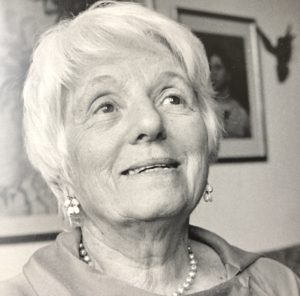
Ruth Rubin in 1986 in NYC
photo by Karen Marshall
Ruth Rubin was my mentor and my friend, and the subject of a video documentary I produced in the 1980’s. I am thrilled that the YIVO Institute for Jewish Research recently launched an online archive of the life work of this remarkable Yiddish folksinger and folklorist. This new online resource “Ruth Rubin Legacy” includes 1100 field recordings of Yiddish folksongs from the 1940’s – 1970’s, video, lectures, documents and photos.
As a fledgling filmmaker in my twenties, I set out to learn more about my Jewish heritage by collecting oral histories. An acquaintance suggested I meet Ruth Rubin. It turned out she was coming to Boston to give a “lecture-recital.” She sang Yiddish folksongs and explained what they revealed about the now disappeared life of the Jews of Eastern Europe. I was so impressed by what this one woman had done to preserve Jewish culture. I spent the next 3½ years producing the documentary “A Life of Song” – now available for free on the Ruth Rubin Legacy website.
For decades following the Holocaust, Ruth Rubin, a self-styled folklorist, traveled North America to collect field recordings of immigrant Jews from Eastern Europe.
“Sing for me a little, what do you remember? Do you know this song?” she would coax her informants gently. “What did your mother sing to you?”
And as the songs came forth, Ruth was there with a reel-reel tape recorder, capturing the rich, vast body of folksongs that provided a window into the everyday lives of the people who created them. These were not performances but true folk expressions that Ruth believed belonged to everyone.
She not only recorded and collected the songs; she then made musical notations, transliterations, translations and sometimes sing-able English versions. She traveled widely, offering her “lecture-recitals,” teaching and singing – acapella – examples of work songs, lullabies, courting songs, drinking songs, protest songs. She published recordings and books such as “Voices of a People” – collections of selected songs complete with analysis. Always with an eye for keeping this cultural expression alive and available for future generations, Ruth donated her recordings to archives around the world.
But aside from a few serious scholars or singers, who accessed these collections? Casual singers have enjoyed her songbooks, but nothing compares to hearing a native speaker’s inflection and pronunciation. Now with a click on a link one can immediately hear the voice of someone sitting at their kitchen table in the 1940’s, singing a Yiddish folksong they remember from their childhood back in Eastern Europe. Ruth Rubin, who died in 2000 at the age of 93, would be amazed and delighted to know that her years of hard work – and the voices of a people – are now readily accessible to so many.
